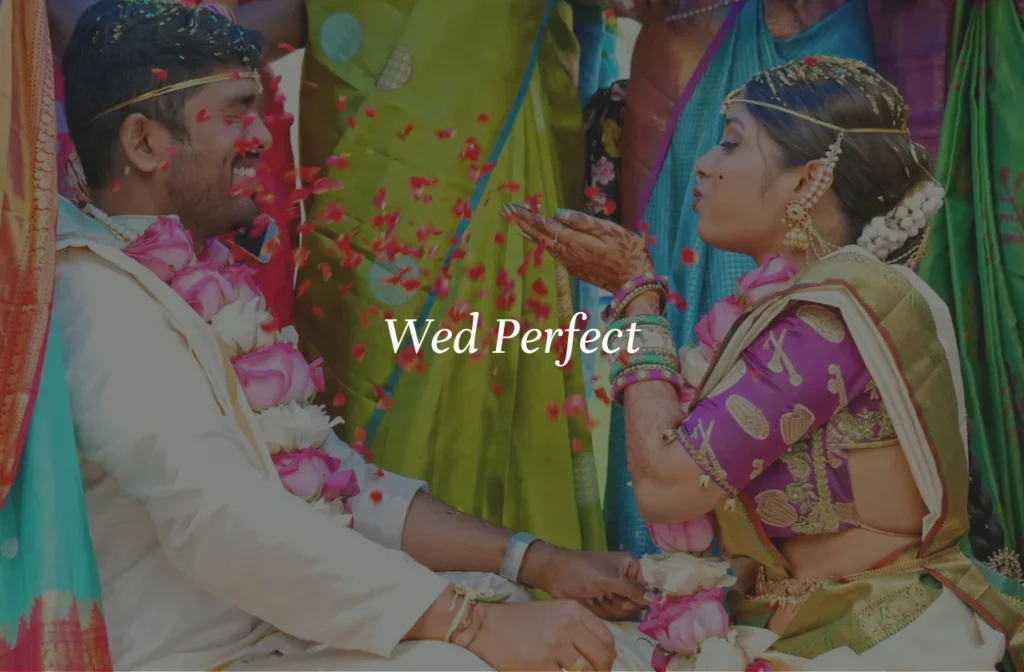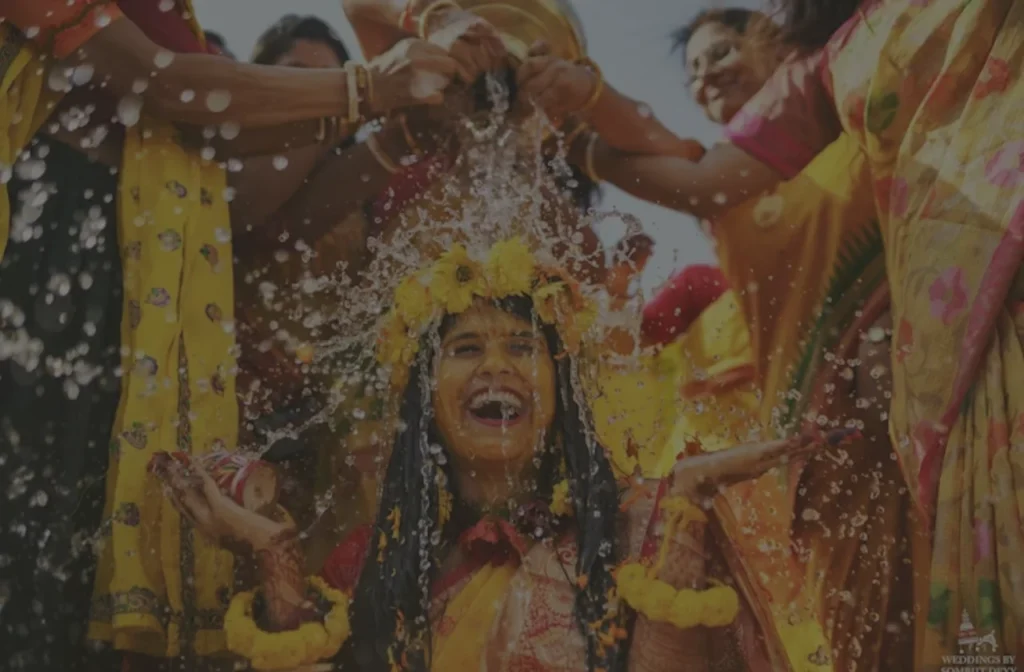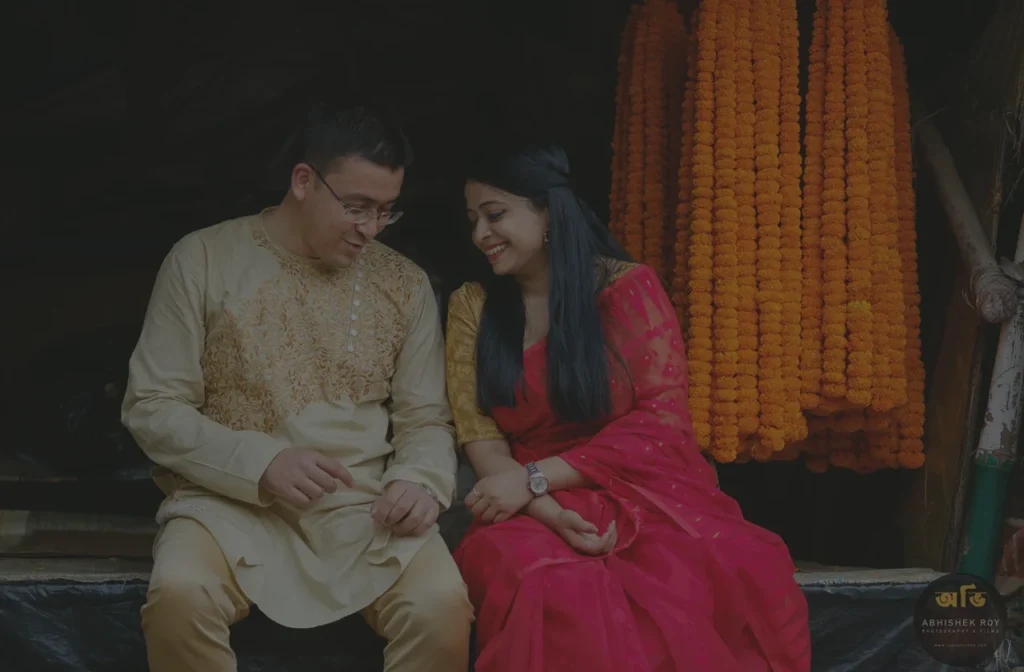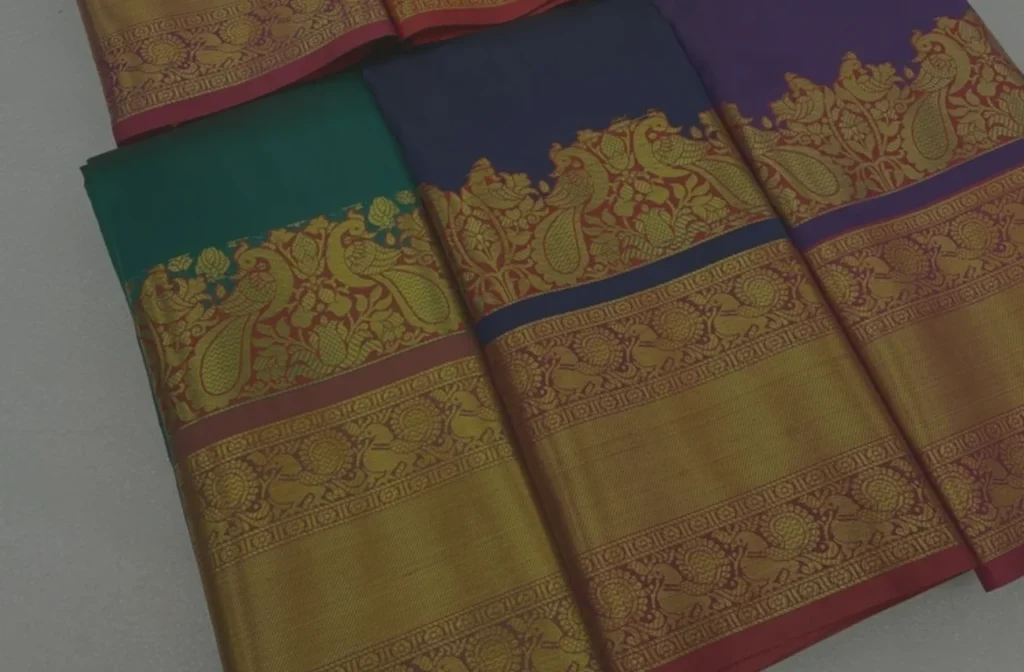Temple weddings in Mumbai have gained popularity as couples seek to embrace tradition while celebrating their big day in a spiritual setting. These weddings are not just a ceremony; they represent the union of two souls, deeply rooted in religious and cultural practices. For many families in Mumbai, a temple wedding offers a serene and sacred environment that sets the perfect stage for a meaningful occasion.
A temple wedding offers more than just a picturesque backdrop. It carries the blessing of divinity and brings families together under the roof of their faith. Many couples prefer temple weddings because they feel the spiritual ambiance strengthens their bond, adding a layer of holiness to their marriage. Additionally, a temple wedding can be a cost-effective alternative to extravagant venues without sacrificing the sacredness of the occasion.
Temple weddings in Mumbai come with unique advantages. First, the city’s rich diversity ensures that couples have a wide variety of religious venues to choose from, whether they belong to Hindu, Jain, or Sikh traditions. Unlike banquet halls or luxury resorts, temples offer simplicity, solemnity, and tradition in abundance. These spaces are often located in historic or culturally significant areas, which can enhance the sense of occasion.
Understanding Temple Weddings in Mumbai
A temple wedding holds deep religious significance. It allows couples to solemnize their marriage in the presence of deities, surrounded by prayers and rituals that have been practiced for centuries. The belief that the gods themselves are blessing the marriage brings peace and positivity to both the couple and their families. It fosters a sense of continuity with ancestral traditions and upholds the religious customs that are passed down through generations.
Different Temple Wedding Traditions (e.g., Hindu, Jain, Sikh)
Mumbai is home to various religious communities, and temple weddings reflect this diversity. Hindu temple weddings are perhaps the most common, involving rituals like the seven vows, or “saat phere,” and the blessing of the sacred fire. Jain weddings, by contrast, emphasize simplicity and focus on non-violence, with rituals centered around the blessing of the couple by elders. Sikh temple weddings, called Anand Karaj, take place in a Gurdwara and include the recitation of hymns from the Guru Granth Sahib, followed by four sacred rounds around the Guru Granth Sahib to signify their commitment.
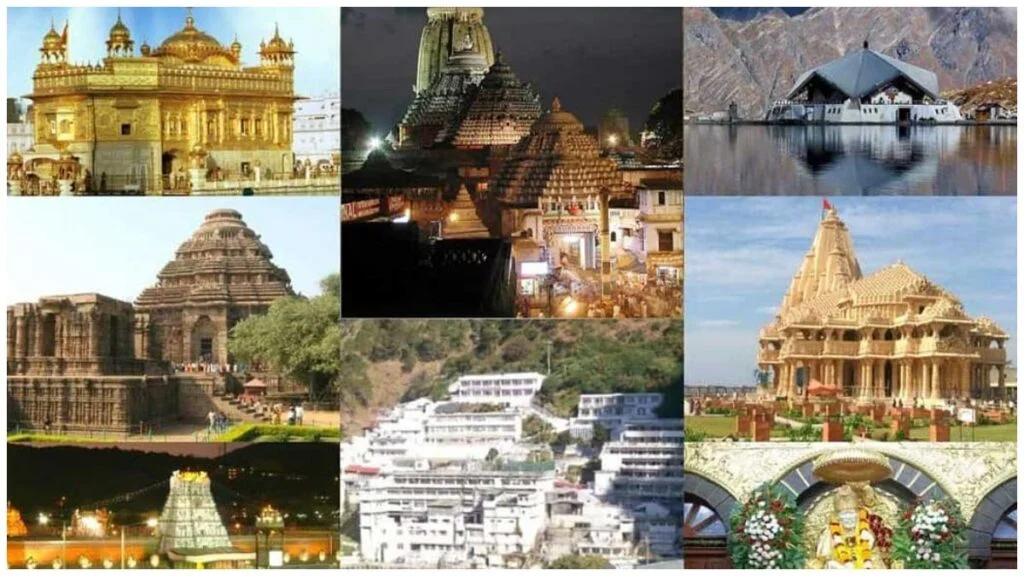
Key Rituals and Ceremonies Involved
Every temple wedding includes a series of rituals that mark the spiritual bond of the couple. These vary based on religious traditions but often include the exchange of garlands (jaimala), the tying of the sacred knot, and the seven rounds (saat phere) around the sacred fire. These rituals signify the couple’s commitment to supporting one another through all of life’s challenges. The presence of a priest or pandit is crucial, as they guide the couple through each ritual, ensuring that all customs are observed correctly.
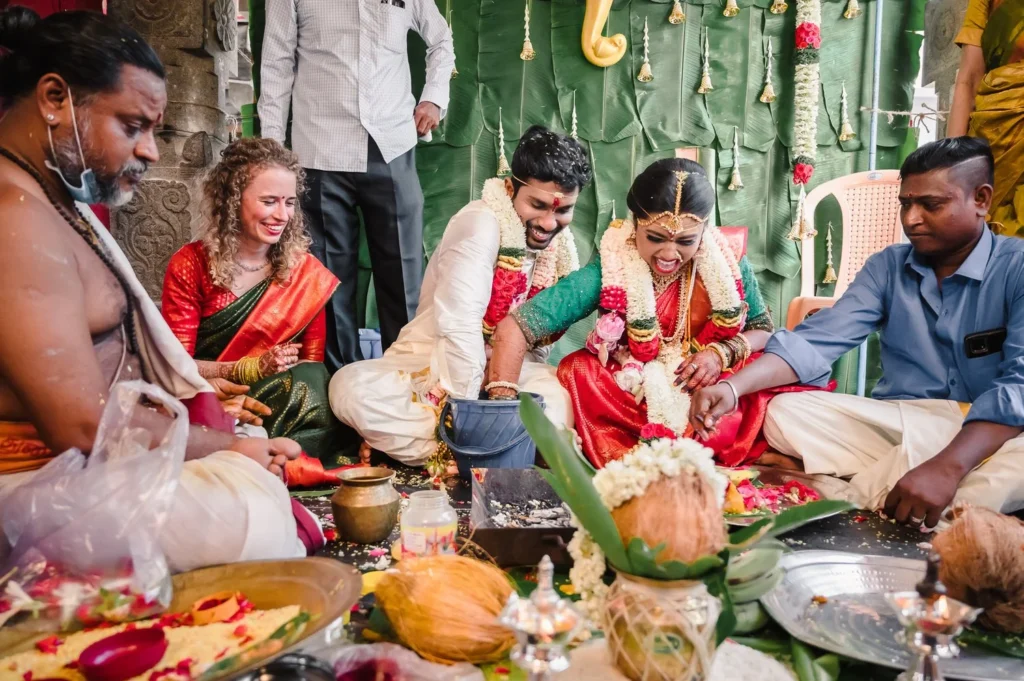
Role of Priests and Pandits
Priests and pandits play a vital role in temple weddings. They not only officiate the ceremony but also ensure that the rituals are performed according to religious scriptures. Their presence brings a sense of authority and spiritual guidance, making the couple and their families feel connected to their faith. They also help in explaining the significance of each ritual to the couple, which makes the wedding more meaningful.
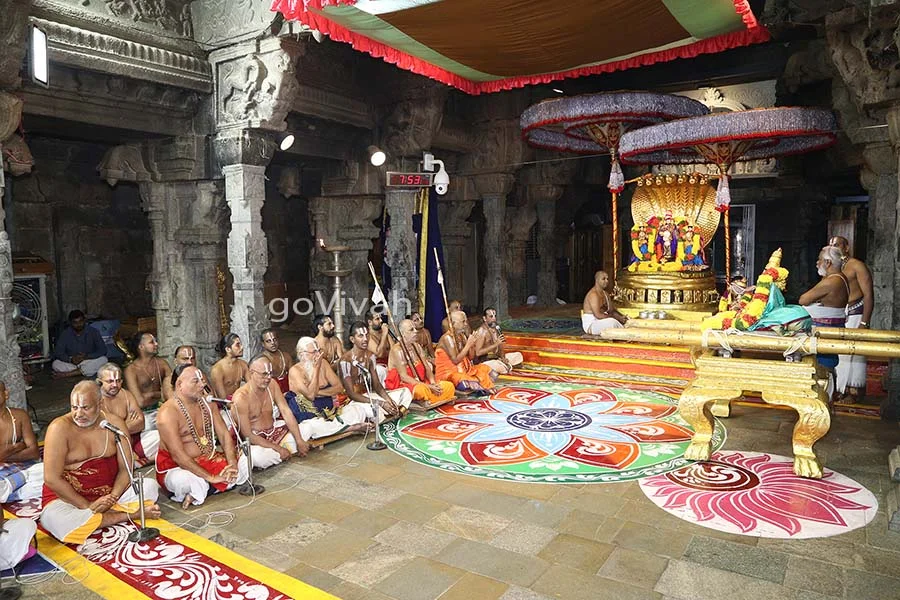
Choosing the Right Temple for Wedding in Mumbai
Choosing the right temple for your wedding involves several factors. First, consider the location. It should be convenient for both families and guests to reach. The temple’s capacity is also crucial, as it needs to accommodate the number of guests you’re inviting. Additionally, ensure that the temple aligns with your religious beliefs and practices. Some temples may have strict rules regarding the type of rituals allowed, so it’s important to confirm this beforehand.
Popular Temples for Weddings in Mumbai
Here are some popular temples in Mumbai that typically allow weddings. It’s always advisable to contact the temple directly for the most accurate and up-to-date information regarding their wedding policies, availability, and booking procedures.
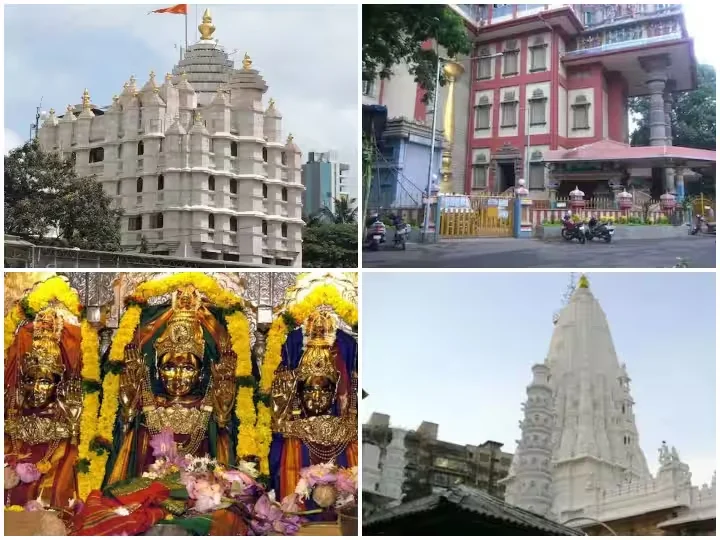
Popular Temples for Weddings in Mumbai
- Siddhivinayak Temple: One of the most renowned temples in Mumbai, dedicated to Lord Ganesha.
- Mahalakshmi Temple: Dedicated to Goddess Mahalakshmi, the goddess of wealth and prosperity.
- Mumbadevi Temple: The patron deity of Mumbai, believed to have been the first deity worshipped in the city.
- Babulnath Temple: Dedicated to Lord Shiva, located on Malabar Hill.
- Walkeshwar Temple: Another ancient temple dedicated to Lord Shiva, located on Malabar Hill.
- ISKCON Temple (Radha Rasabihari Temple): Dedicated to Lord Krishna and Radha, located in Juhu.
- Ghanteshwar Hanuman Temple: Dedicated to Lord Hanuman, located in Santacruz West.
- Balaji Temple (Nerul): Dedicated to Lord Venkateswara (Balaji), located in Nerul, Navi Mumbai.
Other Options to Consider
- Arya Samaj Mandirs: These are non-sectarian Hindu temples that often allow weddings.
- Jain Temples: Many Jain temples also permit weddings.
- Smaller, Local Temples: Some smaller, local temples may also be options, depending on their policies and availability.
Note: While these temples are generally known to allow weddings, specific policies and procedures can vary. It’s essential to contact the temple directly to inquire about their requirements, booking process, and any associated fees. Additionally, consider factors like the temple’s popularity, location, and the time of year you’re planning your wedding when making your choice.
Booking Procedures and Requirements
Booking a temple for your wedding typically requires advance planning. Most temples have specific procedures, such as filling out forms, providing proof of religious affiliation, and making deposits. Some temples also have waitlists, especially the more popular ones. Make sure to inquire about any special requirements, such as clothing restrictions or specific rituals that need to be performed.
Planning Your Temple Wedding in Mumbai
Timeline for Planning a Temple Wedding
The timeline for planning a temple wedding will depend on the availability of the temple, as well as the number of rituals you plan to include. It is advisable to book the temple as early as possible, sometimes six months to a year in advance. This will give you enough time to plan other aspects of your wedding, such as invitations, decorations, and catering. Ensure that your priest or pandit is available on the same date to avoid any last-minute issues.
Obtaining Necessary Permissions and Approvals
Some temples require special permissions to host weddings. This may include approvals from temple authorities or committees. Additionally, you may need to acquire marriage registration forms and other legal documents. Be sure to check these requirements early on, so you don’t face any delays closer to the wedding date.
Guest List and Invitation Etiquette
When planning a temple wedding, it’s important to consider the temple’s capacity and any restrictions on the number of guests. Temple weddings are typically smaller and more intimate than traditional venue weddings. Therefore, your guest list might need to be limited to close family and friends. Make sure to send out invitations well in advance, especially if you have out-of-town guests who will need to make travel arrangements.
Wedding Attire and Decor
For temple weddings, attire often leans towards traditional and modest outfits. Brides may wear sarees, lehengas, or other traditional clothing, while grooms typically wear sherwanis or dhotis. Avoid overly flashy or revealing outfits, as many temples have dress codes that reflect the sacredness of the venue. Decorations should be simple and elegant, often including floral arrangements and religious symbols that complement the spiritual atmosphere.
Catering and Food Arrangements
Temple weddings often include vegetarian catering, in line with religious customs. Many temples even have their in-house kitchens that provide meals for wedding guests. When selecting your caterer, be sure to discuss the specific dietary restrictions of the temple. You may also want to incorporate traditional dishes that are meaningful to your family’s culture and traditions.
Temple Wedding Traditions and Customs
Pre-Wedding Rituals (e.g., Engagement, Mehendi)
Temple weddings often begin with pre-wedding rituals such as the engagement ceremony, where the couple exchanges rings, and the Mehendi ceremony, where the bride’s hands and feet are adorned with intricate henna designs. These rituals are typically celebrated with close family and friends and set the stage for the main wedding ceremony.
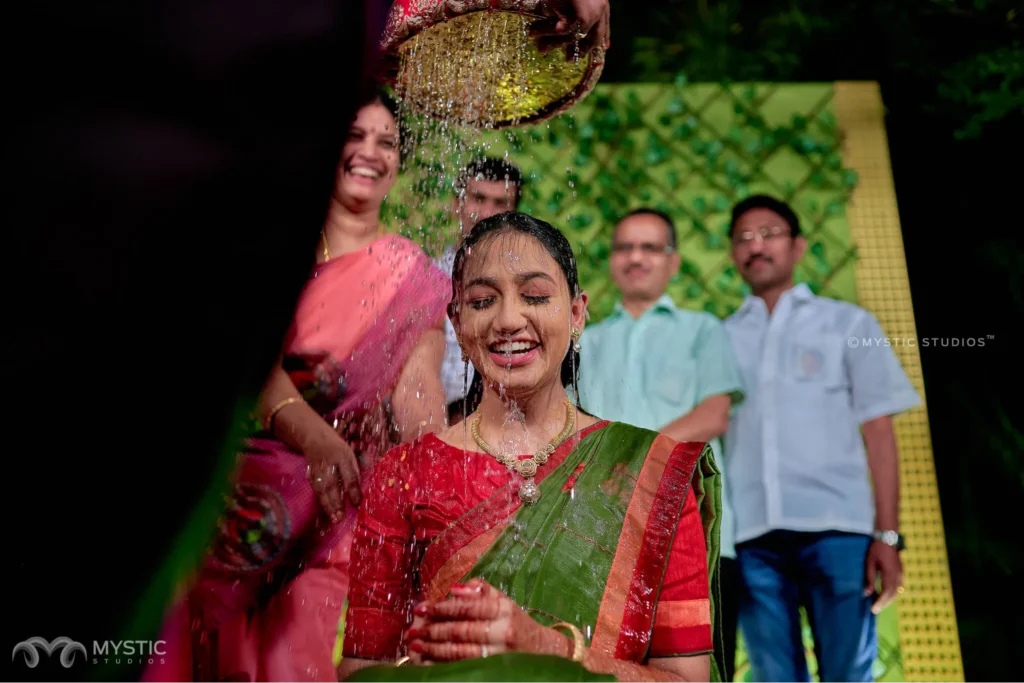
Wedding Day Rituals (e.g., Mandap Setup, Jaimala, Pheras)
On the wedding day, one of the first rituals is the setup of the mandap, a canopy under which the marriage rituals take place. The mandap is usually adorned with flowers and traditional symbols. The ceremony typically begins with the jaimala, where the bride and groom exchange garlands, followed by the sacred pheras, where the couple takes seven vows while circling the sacred fire. These rituals symbolize their commitment to each other and to their families.
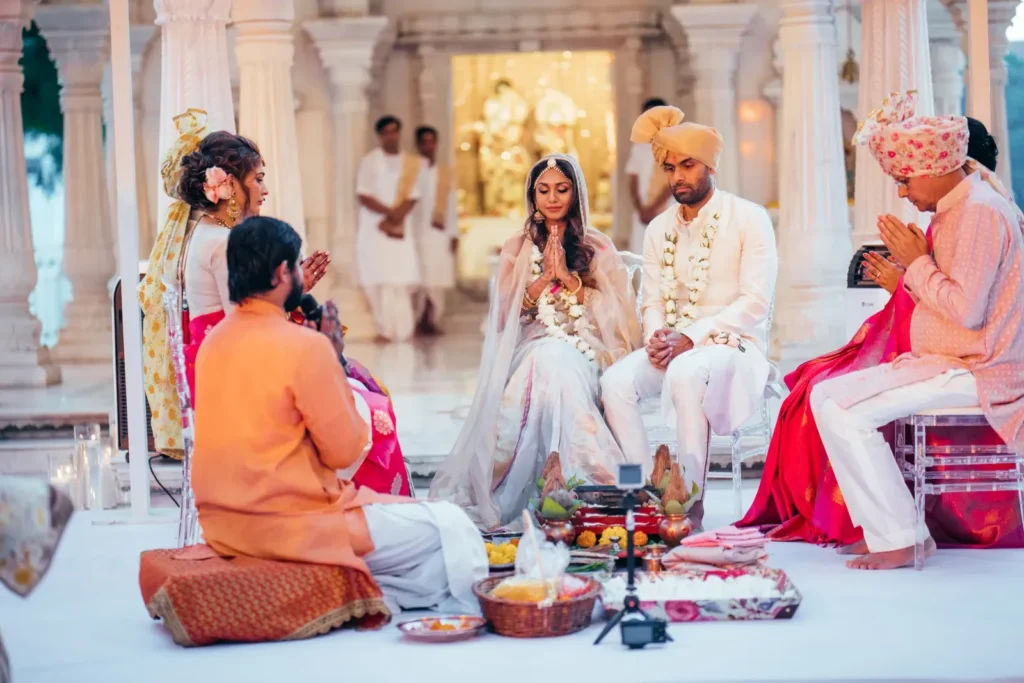
Post-Wedding Rituals (e.g., Vidai, Reception)
After the wedding ceremony, the vidai marks the bride’s departure from her parental home to join her husband’s family. This emotional ritual is often followed by a reception, where guests celebrate the couple’s union with music, dance, and food. Post-wedding rituals may vary depending on cultural customs, but they typically focus on welcoming the bride into her new family.
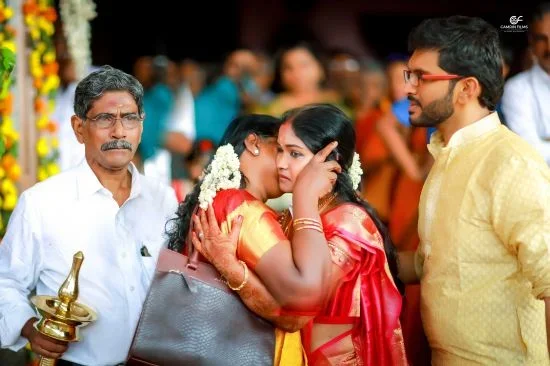
Cultural Nuances and Specific Customs
Temple weddings are rich in cultural traditions and customs. Depending on the couple’s religious background, there may be specific rituals that are unique to their culture. For instance, Maharashtrian weddings include the ritual of ‘Lagna Sohla,’ while South Indian weddings may include the ‘Kanyadaanam’ and ‘Mangalsutra Dharanam.’ Understanding and respecting these customs is important for ensuring that the wedding ceremony is meaningful and respectful of tradition.
Temple Wedding Budget Considerations in Mumbai
Cost Factors for Temple Weddings (e.g., Venue Fees, Priest Fees, Decorations, Catering)
While temple weddings are often more budget-friendly than other venues, there are still several cost factors to consider. Venue fees vary by temple, and larger, more popular temples may charge more. Priest or pandit fees are also a consideration, as they will be officiating the ceremony. Decorations, catering, and photography costs can add up, so it’s important to budget accordingly.
Budgeting Tips for a Memorable Temple Wedding
Start by identifying the most important aspects of your wedding, such as the temple venue and rituals, and allocate your budget accordingly. Keep the guest list small to avoid overspending on food and seating arrangements. You can also save costs by using simple, traditional decorations like marigold garlands and diyas instead of expensive floral arrangements.
Cost-Saving Ideas Without Compromising on Tradition
To save money without compromising on tradition, consider using temple-provided catering services, which are often reasonably priced and aligned with religious customs. Opt for simpler, yet elegant attire that respects the temple’s sacred atmosphere. Additionally, many temples offer in-house decorators, who can create beautiful setups at a lower cost than external vendors.
Tips for a Successful Temple Wedding in Mumbai
1) Dealing with Logistics and Challenges
A successful temple wedding requires careful planning, especially when it comes to logistics. Make sure to coordinate with the temple’s management regarding timing, space, and any restrictions they may have. It’s also important to have a clear plan for the arrival and seating of guests, as temple spaces can sometimes be limited.
2) Choosing the Right Vendors (e.g., Decorators, Photographers)
Selecting the right vendors for your wedding is crucial. Look for decorators who are familiar with temple weddings and can create designs that respect the spiritual ambiance of the venue. Choose photographers who understand the importance of capturing rituals and ceremonies while remaining respectful of the sacred space.
3) Managing Stress and Enjoying the Process
Planning a wedding can be stressful, but it’s important to take time to enjoy the process. Start planning early, delegate tasks to trusted family members, and try to stay flexible when challenges arise. Remember, the true essence of a temple wedding lies in the union of two souls, and that is the most important aspect of the day.
4) Post-Wedding Advice and Tips
After the wedding, take time to relax and reflect on the special moments of your big day. Make sure to send out thank-you notes to guests, especially those who traveled long distances to be there. Finally, take care of any post-wedding legal formalities, such as registering your marriage with the local authorities.
Conclusion
Temple weddings in Mumbai offer a unique blend of tradition, spirituality, and intimacy. They provide couples with a meaningful way to start their married lives together, surrounded by their loved ones in a sacred space. With careful planning, attention to detail, and respect for religious customs, a temple wedding can be a memorable and cherished experience for everyone involved.

